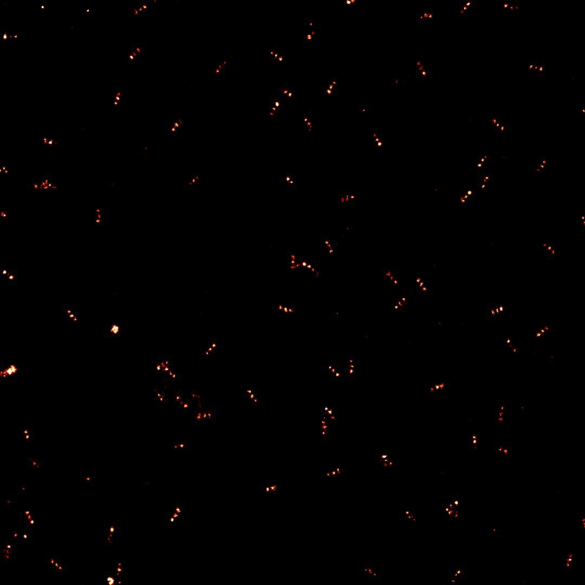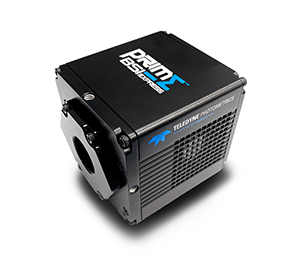DNA PAINT Super Resolution
Dr. John Danial, Prof. David Klenerman
Klenerman Lab, Yusuf Hamied Department of Chemistry, University of Cambridge, UK
Background
Dr. John Danial works as part of the Klenerman Lab to develop biophysical approaches to complex neurodegenerative diseases, such as Alzheimer's and Parkinson's. In these diseases certain proteins can accumulate in the brain and form aggregates, these aggregates can be investigated using extremely sensitive super-resolution microscopy, to uncover the mechanisms of brain diseases.
The approach used by Dr. Danial involves using a super-resolution microscopy technique known as DNA-based Point Accumulation in Nanoscale Topography (DNA-PAINT), this allows for imaging with resolutions smaller than 20 nm, allowing Dr. Danial's custom imaging system to study nanoscopic aggregates.

Figure 1: Image of nanorulers taken with the Prime BSI Express. Each of these nanorulers is made of
DNA origami, with the distance between each bright spot measuring 40 nm. Successful imaging of these is
used to establish the performance of an imaging system.
Challenge
DNA-PAINT involves taking many thousands of images and processing into a super-resolution image, this means any interference during the process can limit the overall image quality.
Dr. Danial spoke about a previous EMCCD solution, used due to the high sensitivity, but otherwise limited in terms of the small FOV limiting throughput, and the high-speed fan causing vibrations that perturbed measurements.
Typical CMOS solutions were also considered but were lacking in terms of noise characteristics and post-processing capabilities, both necessary for DNA-PAINT. A higher-quality CMOS solution was needed, with a large FOV, small pixel, and excellent noise characteristics.
The Prime BSI Express has excellent noise characteristics and imaging quality, it has become the most robust part of my imaging system!
Dr. John Danial
Solution
The Prime BSI Express presents an ideal solution for this application, featuring a large 18.8 mm diagonal FOV, a small 6.5 μm pixel (65 nm when paired with 100x magnification, ideal for oversampling), and extremely high sensitivity, thanks to the combination of near-perfect 95% quantum efficiency for maximizing signal collection, and CMS mode minimizing read noise to near 1 e-.
Dr. Danial told us about his experience "I am very happy with the Prime BSI Express, it is the most robust part of my imaging system and I appreciate the small form factor... I had no problems with the setup and integrating the camera into our custom LabView software using the SDK."

Learn More About The Prime BSI Express